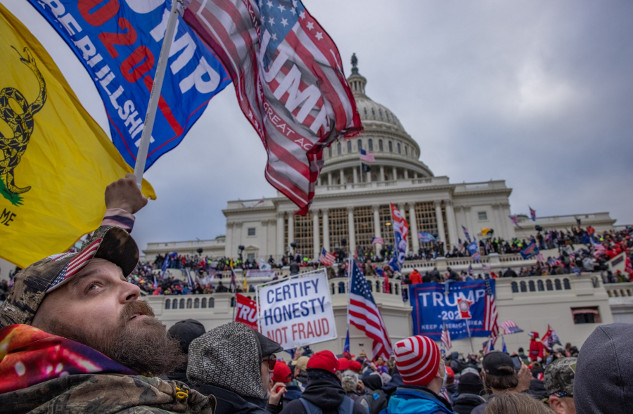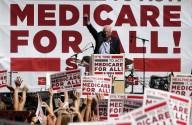
A crowd of protesters gathered outside the U.S. Capitol building, waving flags and holding signs supporting Donald Trump, during a political rally.
Article Summary:
Over 50 years, false and politically induced fears have led to significant public reactions, shaping policies and social behaviors. From the aftermath of 9/11 to the War on Drugs, immigration fears, and the COVID-19 pandemic, fear-based propaganda has influenced public opinion and policy. This article explores these incidents, their impact on society, and how individuals can build resilience against such tactics.
How Fear-Based Propaganda Shapes Society
For 40 to 50 years, a significant segment of the American public has been continually exposed to a diet of fearful propaganda and advertising. This phenomenon, marked by the strategic use of fear to influence public opinion and behavior, has not only shaped the nation's political landscape but also profoundly affected its social fabric and the mental health of its citizens. From Cold War-era' duck and cover' advertisements to modern-day political campaigns that exploit fears of terrorism or economic collapse, fear has been a consistent tool to grab attention and sway public opinion.
The roots of this trend can be traced back to various political and advertising campaigns over the last few decades. From Cold War-era advertisements to modern-day political rhetoric, fear has been a consistent tool to grab attention and sway public opinion. The evolution of media – from television's dominance to the advent of the internet and social media – has only amplified this effect. As media consumption patterns changed, so did the methods of delivering these fear-based messages, making them more pervasive and persistent.
One of the most noticeable consequences has been the erosion of social cohesion and trust. Once close-knit communities now find themselves fragmented, often falling prey to an "us vs. them" mentality. This division is not just ideological but has seeped into everyday interactions, leading to mistrust and apprehension. The impact extends into cultural and educational spheres, where fear-driven narratives have shifted cultural norms and stifled critical thinking and open debate in academic settings.
Psychological and Health Effects
The relentless stream of fearful messaging in our media and public discourse has had a profound impact on the nation's mental health. This phenomenon has been closely linked to increasing rates of anxiety, depression, and other mental health disorders. The correlation between mental health rise and increased exposure to fear-based content is very troubling.
The psychological impact of living in a constant state of fear goes deep into the psyche of individuals, leading to a state of perpetual stress and anxiety. It's not just a fleeting sense of worry but a continuous hum of anxiety that affects our daily lives. This persistent state of mental distress spills over, affecting our physical health as well. This mind-body connection is well-established, and the stress that starts in the mind manifests in the physical body in various forms, from headaches and fatigue to more serious conditions like heart disease and hypertension.
Alongside these direct health impacts, the culture of fear also drives other lifestyle changes that further exacerbate health problems. In an attempt to cope with or escape their anxieties, we may adopt unhealthy habits such as overeating, physical inactivity, or substance abuse. These lifestyle shifts, in turn, contribute to their own range of health issues, including obesity, diabetes, and substance dependence.
Furthermore, continual exposure to stressful stimuli disrupts our sleep patterns, leading to sleep disorders, which have wide-ranging adverse effects on our health. Rather than treating the symptoms, we must understand and tackle the root cause of our fears. This requires reevaluating how we consume information that triggers this fear.
Economic and Political Consequences
The economic ramifications of a society steeped in fear are both direct and far-reaching. When it comes to consumer behavior – a critical driver of the economy – there has been a noticeable shift in spending patterns reflective of the prevailing public sentiment. A sense of uncertainty and apprehension leads many to become more conservative in spending and holding back on non-essential purchases.
This caution has ripple effects, slowing down economic activity in various sectors, from retail to entertainment and hospitality. Fear and anxiety can also lead to panic buying and stockpiling goods. This behavior creates temporary shortages, disrupts supply chains, and inflates prices, further contributing to economic instability. This swing between caution and panic creates uncertainty that undermines the steady growth and stability of the economy.
The strategic use of fear in political discourse has proven to be a powerful tool in influencing public opinion and swaying voter behavior. Elections and political campaigns have increasingly relied on fear-based messaging to create a sense of danger and urgency rather than engaging in reasoned debate over effective policies and ideas. While effective in garnering short-term political gains, this tactic has significant long-term implications. It contributes to the erosion of democracy and civil liberties.
Many that succumb to fear and anxiety are more likely to vote for an authoritarian figure like Donald Trump. They overlook their freedom in a quest for security. Furthermore, this manipulation of fear leads to decisions and allegiances against their best interests.
Over the past 50 years, several incidents have highlighted how false and politically induced fears can lead to adverse public reactions. Following the 9/11 terrorist attacks, the widespread fear of further attacks led to the implementation of the USA PATRIOT Act, which expanded government surveillance capabilities and reduced civil liberties, and the invasion of Iraq under the false pretense of weapons of mass destruction.
The War on Drugs, initiated in the 1980s, was driven by fears of drug abuse and resulted in stringent drug laws, mass incarceration, and significant racial disparities in sentencing, devastating many communities.
More recently, political rhetoric has fueled fears surrounding immigration, leading to policies that separate families, detain asylum seekers, and build barriers, causing significant humanitarian issues.
The COVID-19 pandemic saw a range of fear-driven reactions, from panic buying and stockpiling to widespread misinformation about the virus and vaccines. These reactions resulted in polarized public opinions and resistance to health measures. These incidents demonstrate the profound impact of fear on public behavior and policy, often to the detriment of societal well-being.
Counteracting the Effects
Our role in countering the fear we are exposed to is crucial. Start by enhancing media literacy. We must equip ourselves with tools to assess information critically, question the sources, and seek out multiple perspectives and sources before forming an opinion.
Staying informed without becoming overwhelmed is essential; limit exposure to sensationalist media by choosing reliable news sources that provide balanced reporting and setting specific times to check the news to reduce anxiety. This practice helps discern credible information from fear-based propaganda.
Engage with friends, family, and community members who provide positive reinforcement and factual information. Participating in local events and discussions helps build strong, trusting relationships. Additionally, practicing stress management with activities like meditation, exercise, and hobbies can help manage anxiety caused by constant exposure to fearful messages.
Educating yourself on critical thinking is also vital. Share what you learn with others. Promoting open communication encourages respectful discussions about current events and societal issues, creating an environment where fear-based tactics are less effective. Most of all, you should change your opinion when confronted with new information. Those falsehoods become ingrained when we don't, adversely affecting our decision-making and behavior.
By taking these steps, you can reduce the influence of fear in our lives and contribute to a more informed and resilient society. Our actions, no matter how small, play a vital role in countering the divisive effects of fear and promoting trust and social cohesion
As we look to the future, the challenges posed by the continued use of fear in media and politics are daunting. However, there are opportunities for positive change. By understanding the mechanisms and impacts of fear, society can find ways to rebuild trust and social cohesion. While it is true that policymakers, the media, educators, and community leaders have a crucial role in reducing unreasonable and false fears, it's not just them. Each of us has the power to contribute to a more informed public discourse, and that's where the real change begins.
The long-term exposure of the American public to fearful propaganda and advertising has had profound effects on the nation's social, psychological, and political fabric. Understanding these effects is the first step in addressing them. As we move forward, the challenge will be to recognize the impact of fear and actively work toward countering its divisive and harmful effects.
Conclusion:
Understanding the impact of fear-based propaganda and political fear tactics is crucial for fostering a more informed and resilient society. By enhancing media literacy, building supportive networks, and promoting open communication, individuals can counteract the adverse effects of fear. Learning from past incidents, such as 9/11, the War on Drugs, immigration fears, and the COVID-19 pandemic, can help us navigate future challenges with greater awareness and strength. Your proactive steps can contribute to a healthier, more connected community.
About the Author
 Robert Jennings is co-publisher of InnerSelf.com with his wife Marie T Russell. He attended the University of Florida, Southern Technical Institute, and the University of Central Florida with studies in real estate, urban development, finance, architectural engineering, and elementary education. He was a member of the US Marine Corps and The US Army having commanded a field artillery battery in Germany. He worked in real estate finance, construction and development for 25 years before starting InnerSelf.com in 1996.
Robert Jennings is co-publisher of InnerSelf.com with his wife Marie T Russell. He attended the University of Florida, Southern Technical Institute, and the University of Central Florida with studies in real estate, urban development, finance, architectural engineering, and elementary education. He was a member of the US Marine Corps and The US Army having commanded a field artillery battery in Germany. He worked in real estate finance, construction and development for 25 years before starting InnerSelf.com in 1996.
InnerSelf is dedicated to sharing information that allows people to make educated and insightful choices in their personal life, for the good of the commons, and for the well-being of the planet. InnerSelf Magazine is in its 30+year of publication in either print (1984-1995) or online as InnerSelf.com. Please support our work.
Creative Commons 4.0
This article is licensed under a Creative Commons Attribution-Share Alike 4.0 License. Attribute the author Robert Jennings, InnerSelf.com. Link back to the article This article originally appeared on InnerSelf.com













